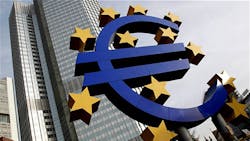European Stocks End Sharply Higher on Bright Eurozone Data
LONDON -- Europe's main stock markets ended the session on an upbeat note on Thursday, recovering from previous days' losses on better-than-expected eurozone and Chinese economic data, dealers said.
A number of currencies in emerging markets however, including the Indian rupee, Russian ruble and Turkish lira, took a severe beating as minutes released by the US Federal Reserve on Wednesday failed to dispel fears of a quick end to its quantitative easing (QE) stimulus.
London's FTSE 100 index of top blue-chip companies rose 0.88% to finish the day at 6,446.87 points.
Frankfurt's DAX 30 advanced 1.36% to 8,397.89 points, while the CAC 40 in Paris rose 1.10% to 4,059.12 points.
"After the Fed induced declines of recent days it's nice to see markets concentrating on the more mundane drivers of economic data and reacting to a broad macro improvement in manufacturing data from both China and Germany," CMC Markets UK analyst Michael Hewson said.
In foreign exchange trade, it was a busy day, with much of the focus on the U.S. stimulus scale-back plans.
India's rupee currency dived to 65.56 against the dollar at one point as worries about the Fed cash were compounded by growing fears about the state of the Indian economy, but it later retraced slightly to 64.63.
The Russian ruble also fell to a four-year low of 44.18 rubles to the euro.
The single European currency was flat against the dollar at $1.3356 from $1.3357 late in New York on Wednesday, while the dollar gained to 98.49 yen from 97.71 yen.
Sterling fell against the euro, with one pound buying 1.1665 euros from 1.1730 on Wednesday. It also retreated to $1.5583 after reaching a two-month high point of $1.5701 during trading on Wednesday.
Manufacturing Improves in Europe, China
European investors welcomed news that eurozone business activity picked up sharply in August, hitting a 26-month high point as the economy climbed out of a record recession.
The Composite Purchasing Managers' Index compiled by Markit Economics jumped to 51.7 points for August from 50.5 in July, pushing further beyond the 50-points boom-or-bust line.
Analysts polled by Dow Jones Newswires had expected an August reading of 51 points after the Composite PMI moved into positive territory in July for the first time in 18 months.
Markit said its separate PMI for the services sector -- which accounts for the bulk of economic activity -- rose to 51 in August for a 24-month high. The manufacturing sector PMI hit a 26-month peak at 51.3 points.
"It's still early but this could suggest that the second quarter growth was no one-off and we could actually be starting to see confidence return to the euro area. This is essential if the area is going to avoid falling straight back into recession," Alpari trader Craig Erlam said.
Recent data showed that the 17-nation eurozone grew 0.3% in the second quarter compared with the first, breaking a record 18-month recession.
Sentiment was also lifted as HSBC's preliminary PMI showed growth in Chinese manufacturing in August for the first time in four months.
HSBC said its PMI came in at 50.1 in August, compared with a final reading of 47.7 in July.
"Better than expected manufacturing data out of China ... called into question a lot of negativity around Chinese growth forecasts we've seen over the past weeks," CMC Markets analyst Matt Basi said.
On Wall Street, stocks were also higher.
In midday trading, the Dow Jones Industrial Average was up 0.27%, the broad-based S&P 500 added 0.61%, while the Nasdaq Composite jumped 0.78%.
Minutes of the July 30-31 meeting of the Federal Open Market Committee showed the Fed continued to debate the timing of tapering or scaling back its $85 billion per month in bond-buying purchases.
On the London Bullion Market, the price of gold rose to $1,375.50 an ounce from $1,363 on Wednesday.
On the securities market meanwhile, 10-year U.S. government bonds edged up to 2.90%, while Germany's rose to 1.92% and Britain's climbed to 2.72%.
-- Roland Jackson, AFP
Copyright Agence France-Presse, 2013
About the Author
Agence France-Presse
Copyright Agence France-Presse, 2002-2025. AFP text, photos, graphics and logos shall not be reproduced, published, broadcast, rewritten for broadcast or publication or redistributed directly or indirectly in any medium. AFP shall not be held liable for any delays, inaccuracies, errors or omissions in any AFP content, or for any actions taken in consequence.
